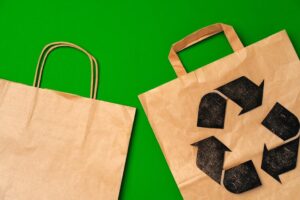 Are paper bags truly eco-friendly, or do plastic bags still have a place in modern life? Discover the hidden truths about these common carriers.
Are paper bags truly eco-friendly, or do plastic bags still have a place in modern life? Discover the hidden truths about these common carriers.
As the global conversation around environmental sustainability grows, the debate between paper bags and plastic bags intensifies. While many see paper bags as the greener alternative, the reality isn’t as straightforward. Factors like energy consumption, carbon emissions, and end-of-life disposal significantly impact the sustainability of both options.
In this article, we’ll examine the environmental impact of paper bags versus plastic bags. From raw material extraction to disposal, we’ll analyse each stage to uncover which option is genuinely better for the planet. We’ll also explore how printed bags factor into this debate.
The Life Cycle of a Paper Bag
Paper bags are often considered an eco-friendly choice due to their biodegradable nature. However, their production tells a more complex story.
- Raw Materials: Paper bags are made from wood pulp, which requires cutting down trees. This deforestation contributes to habitat destruction and carbon release. For every ton of paper bags produced, approximately 17 trees are felled.
- Energy Use: Transforming wood into paper is an energy-intensive process. Studies show that producing paper bags consumes about four times more energy than producing plastic bags.
- Water Footprint: Paper bag manufacturing requires significant water use. Producing one ton of paper consumes around 13,000 gallons of water.
Despite their biodegradable benefits, paper bags have a substantial environmental footprint during production.
The Environmental Costs of Plastic Bags
Plastic bags, often demonised for polluting oceans and landscapes, are more resource-efficient to produce compared to paper bags.
- Energy Use: Producing plastic bags requires less energy and water. One study found that plastic bags consume about 70% less energy than paper bags.
- Longevity: Although durable, plastic bags can persist in the environment for hundreds of years if not properly managed. It contributes to marine pollution, where an estimated 8 million tons of plastic enter the oceans annually.
- Recycling Challenges: Plastic bag recycling rates are low due to contamination and difficulty in processing. Only 9% of all plastic waste produced has been recycled.
While plastic bags are lightweight and cost-effective, their environmental toll lies in improper disposal and limited recyclability.
Carbon Emissions: Paper vs. Plastic
The carbon footprint of a product is a crucial metric in assessing its environmental impact. Here’s how paper and plastic compare:
- Paper Bags: Due to the energy-intensive manufacturing process, paper bags produce three times more carbon dioxide (CO2) than plastic bags during production.
- Plastic Bags: Although their production emits less CO2, plastic bags contribute significantly to emissions when improperly discarded, releasing methane as they degrade in landfills.
Interestingly, reusable printed bags—made of cotton or recycled materials—can significantly lower carbon emissions by reducing the need for single-use alternatives.
Durability and Reusability
Durability is an essential factor when comparing paper and plastic bags.
- Paper Bags: These bags are less durable and more prone to tearing when wet or overloaded. It often leads to single-use disposal, increasing waste.
- Plastic Bags: Their strength and flexibility make them more reusable. A single plastic bag can be reused 3–5 times before disposal.
If paper bags are used only once, their environmental cost far outweighs that of plastic. Encouraging reuse is key to reducing their impact. Similarly, printed bags crafted from durable materials can be a long-lasting alternative to both.
End-of-Life: Biodegradability and Recycling
How a product decomposes or is recycled significantly affects its overall sustainability.
- Paper Bags: Paper is naturally biodegradable, breaking down within weeks in soil. However, recycling paper bags requires removing any ink or coatings, which can be resource-intensive.
- Plastic Bags: These are not biodegradable and can take 500+ years to break down. However, some programs collect and recycle plastic bags into new products, like composite lumber.
Choosing printed bags made from recycled or compostable materials can ensure a lower environmental impact at the end of their life cycle.
Which Is Better for the Environment?
The answer isn’t black and white—it depends on usage patterns, recycling infrastructure, and production methods.
- Single-Use Scenarios: Plastic bags are less resource-intensive to produce but pose disposal challenges. Paper bags, while biodegradable, consume significant resources during manufacturing.
- Reusable Alternatives: Switching to reusable printed bags made from cloth, jute, or recycled plastic can significantly reduce environmental impact.
- Policy Interventions: Many governments are implementing bans or taxes on single-use bags to encourage sustainable choices. For instance, Ireland’s plastic bag levy reduced usage by 90% within a year.
Ultimately, there are better solutions than paper and plastic. The most sustainable strategy is to prioritise reusable, environmentally friendly alternatives.
Final Thoughts
The debate over paper and plastic bags reveals that both have significant environmental costs. While paper bags offer biodegradability, their production demands substantial resources. Plastic bags, though lightweight and durable, are an essential contributor to pollution when mismanaged.
The best way forward is to minimise reliance on single-use bags altogether. Reusable printed bags made from sustainable materials offer a practical and eco-friendly alternative. By choosing wisely and advocating for better recycling systems, we can reduce waste and lessen our environmental impact.
Leave a Reply